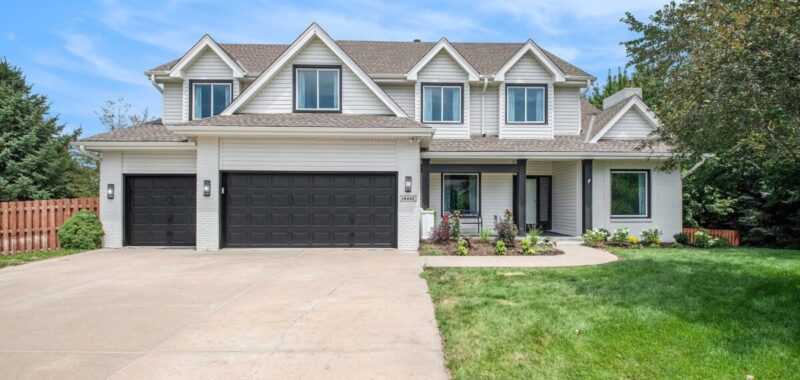When buying a home, financial considerations go beyond the sale price. One crucial expense that many homebuyers often overlook is closing costs.
Closing costs are the final expenses that need to be paid in order to close on a real estate transaction, such as taxes, lender fees, and title insurance. Let’s break down how much closing costs are in Nebraska, who pays for them, and what costs you can expect to pay as a buyer and as a seller.

How much are closing costs in Nebraska?
Before securing the keys to your new home, homebuyers will need to pay for closing costs. Closing costs in Nebraska typically range from 2%-5% of the home’s purchase price. But it’s important to remember that this is just a range and the total amount will depend on numerous factors, such as the purchase price of the home, the type of loan, and any adjustments negotiated with the seller.
Let’s say you’re buying a home in Omaha, where the median home sale price is $275,000. Based on this, you could expect closing costs to be between $5,500 and $13,750. Whereas if you’re buying a home in Lincoln, which has a median sale price of $292,500, closing costs could be anywhere from $5,850 to $14,625 .
Who pays closing costs in Nebraska?
In most areas, including Nebraska, both the buyer and the seller will pay closing costs. But the buyer and seller will pay for different closing costs and likely have different total closing cost amounts. Another thing to keep in mind is that buyers typically pay for closing costs out of pocket, while the seller’s closing cost payments are often deducted from the home sale proceeds.
Buyer closing costs in Nebraska
For homebuyers in Nebraska, you can expect to pay between 2%-5% of the home’s purchase price. In most cases, you’ll pay earnest money, typically 1% to 3% of the home price, upon reaching mutual acceptance in your home purchase. This deposit is subtracted from your closing costs, reducing the total amount due at closing. Below are some of the common closing costs paid for by the buyer:
- Appraisal fee: Your mortgage lender will require a home appraisal to ensure the home value is equal to or more than the loan amount. Home appraisals typically cost between $300 and $500, depending on location. If you pay at the time of service, it will not be included in your closing costs.
- Inspection fee: Although not required, a home inspection is highly recommended. Home inspections generally range from $300 to $500 in cost and are usually paid at the time of service. However, if not, it will need to be paid at closing.
- Loan origination fee: Your lender may charge a fee for creating your loan. It’s important to inquire about what this cost covers and whether it’s negotiable to potentially avoid high costs.
- Loan processing fee: In addition to the origination fee, your lender may also charge a fee for processing your loan. This typically covers underwriting and related services. It’s recommended to discuss this fee with your lender to understand what this fee covers and if it can be waived.
- Loan discount points: If you’ve purchased points to lower your interest rate, you’ll usually pay a one-time fee at closing. Each point can lower your rate by 0.25% to 0.5%. Consider your long-term plans, such as how long you plan to own the home or if you plan to re-finance, before purchasing points.
- Private mortgage insurance (PMI): When your down payment is under 20%, you’re typically required to pay PMI. Some loans allow upfront PMI payment at closing, giving you the choice between higher upfront costs or increased monthly payments.
- Title insurance: Title insurance is a one-time closing cost, with buyers commonly paying for both lender and owner policies.
- Homeowners insurance: In Nebraska, your annual homeowner’s insurance premium may be part of your closing costs.
- Homeowners Association dues: For homes in HOA-managed communities, you might have to pay one month’s dues at closing, which can vary depending on the property and covers maintenance and operational expenses.
- Property taxes: Buyers may have to prepay property taxes as part of their closing costs in Nebraska.
Seller closing costs in Nebraska
The closing costs covered by sellers in Nebraska can vary, but here are a few common closing costs that sellers pay for:
- Real estate agent commission fees: These fees can be a significant cost for sellers. Commission fees may vary and are subject to negotiation. Sellers should discuss their options with their agent.
- Homeowners Association fees: If the property is part of a homeowners association, sellers are usually responsible for settling any outstanding HOA fees or assessments up to the date of closing. Additionally, sellers may need to provide certain HOA documents to the buyer as part of the sale.
- Property taxes: Any outstanding property taxes will be due at this time. However, if the seller has prepaid property taxes for the period that extends beyond the closing date, they may be credited back for the portion they’ve paid but won’t use.
- Title insurance: As part of closing costs for sellers in Nebraska, sellers may pay for owner’s title insurance. Typically, this cost is based on the property’s sale price.
- Transfer taxes: If you’re selling a home in Nebraska, you can expect to pay a state levied real estate transfer tax. These taxes are typically calculated based on the sale price or assessed value of the property. The specific rates and regulations can vary widely, so it’s important to be aware of the requirements in your area and factor in these potential costs when selling a property.
Median home sale price data from the Redfin Data Center during July 2024.

